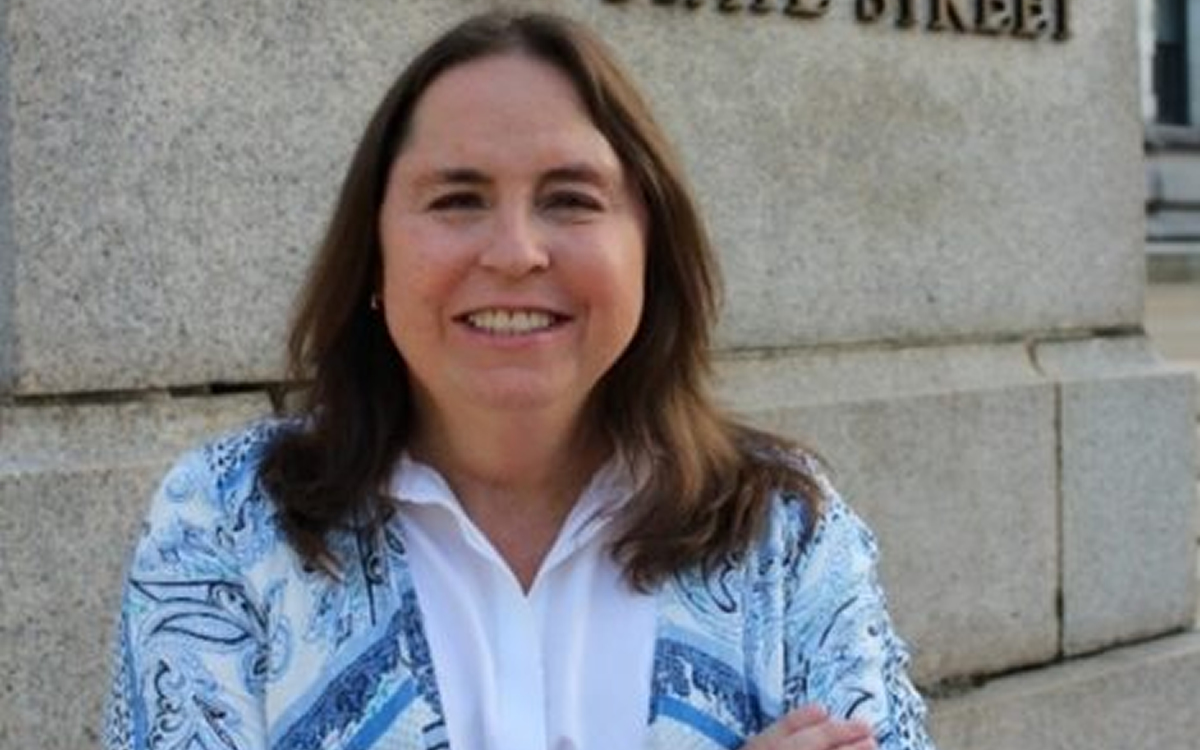Politics
State and local LGBTQ elected officials detail how they battle hate
LGBTQ Victory Fund endorsed many out candidates in 2022.

Just a few months ago, the midterm elections saw a “rainbow wave” with a record-breaking number of LGBTQ candidates elected to public office across the country.
After statehouses and city councils and other legislative bodies opened for new business, however, within weeks it became clear that Americans can expect to see a greater number of anti-LGBTQ bills and policies in 2023 than were introduced in any year in recent memory.
Five LGBTQ officials, both newly elected and reelected, recently connected with the Washington Blade to discuss their observations from the campaign trail and experiences in elected office. They shared reactions to the spate of harmful proposals that have been introduced so far and detailed plans for advancing pro-equality legislation while fighting against anti-LGBTQ policies this year and beyond.
New Hampshire State Rep. Gerri Cannon talked with the Blade earlier this month, and newly elected Trenton (N.J.) City Councilwoman Jennifer Williams responded to written questions last week. First-time officeholders Montana state Rep. Zooey Zephyr and Connecticut State Treasurer Erick Russell, along with returning Colorado Senate Majority Leader Dominick Moreno, each sat down with the Blade last month during the International LGBTQ Leaders Conference in D.C.
The conference was hosted by the LGBTQ Victory Institute, which administers programs and trainings for elected leaders whose campaigns are supported by the LGBTQ Victory Fund political action committee. Former Houston Mayor Annise Parker, who serves as president of the LGBTQ Victory Fund and Institute, also talked to the Blade earlier this month.
So diverse are the identities, backgrounds, experiences and political views of these officeholders that they shatter restrictive notions that LGBTQ candidates must fit into a certain mold or serve only in certain elected positions.
How were they treated on the campaign trail?

Zephyr, who became the first openly transgender person elected to the deep-red Montana Legislature, told the Blade she was nervous about the prospect of knocking on doors for the first time.
“There’s always that fear as a trans person that it only takes one scary moment,” she said. “But what I found was what I always knew: My community supported me and loved me.”
Many of Zephyr’s constituents, she said, “were excited to see me and to be talking to a trans woman about policy,” as well as LGBTQ issues. Many voters were eager to get into substantive discussions on topics as wonky as how policies concerning solar power might intersect with local unionization efforts, she said.
“What I saw in my community, and what I’ve seen, broadly, across Montana, is first and foremost kindness and community,” Zephyr said.
Russell, who with his election for Connecticut treasurer became the first gay Black man to serve in statewide office, said his constituents were “excited about the fact that they felt they were represented in a campaign” with many voters relating to Russell’s “humble beginnings.”

Voters were also heartened to see a younger candidate running, said Russell, who earned his bachelor’s degree in 2009 and graduated from law school at the University of Connecticut in 2012.
His identity aside, “at the end of the day, we were running a campaign that was built on substance,” he said. And “people want to know that they’re going to have advocates for their communities.”
Likewise, Cannon told the Blade, “I don’t use my status as being a trans person as a lever in most cases. I’m fighting for people in my community; I’m there to do the people’s business, and I just happen to be transgender.”

“I haven’t run into anyone that’s used my status as a trans person during an election cycle,” said Cannon, who has served in the New Hampshire Legislature since 2018.
“When I ran for City Council here in Trenton,” Williams said by email, we “probably knocked on 3-4,000 doors and spoke with all kinds of people.” The questions she and her team received concerned crime, jobs, public utilities like water and roads, and Williams’ ability to work constructively with other councilmembers, she said.

Williams, who recently became Trenton, N.J.’s first LGBTQ city council member and is the one of the state’s first openly transgender officeholders, said that voters did not ask about her gender identity or sexual orientation, nor did they bring up politically divisive topics like policies concerning the participation of trans athletes in school sports leagues or drag queen story hours.
Likewise, since her election to the city council, Williams’ Council colleagues who have been sworn in as well as her at-large colleagues who won their runoff elections last Tuesday have been supportive — “very much so,” she told the Blade.
At the same time, Williams said she encountered some challenges because of her being a Republican. It “has been an issue with some people who are beyond my immediate circle or who haven’t gotten a chance to know me and support me,” she said.
“Some of my biggest supporters are very well-known local Democrats because they have seen the LGBTQ advocacy work and civic involvement that I have done in the past,” Williams said. “They also have very good ‘ears to the ground’ and trust me, people would tell them if I had come to canvass their neighborhood and if they spoke with me.'”
Williams expressed gratitude for the “endorsement and support” she received for her candidacy from the Victory Fund as well as for her progressive and Democrat supporters, because “they took a chance on believing in me and stuck with me even when they caught some hell for doing so.”
How will they approach challenging colleagues or difficult political circumstances?
Parker told the Blade there is room for LGBTQ elected officials to make a positive impact even in the most challenging of circumstances.
“We are just as interested in seeing them be who they are and stand up and speak out in their legislatures — whether or not they can pass pro-equality legislation,” she said.
When passing pro-equality policy or batting away harmful policy is difficult, Zephyr said she expects to draw from some of the lessons she learned as an athlete: “if you put in the work, day in and day out, you will see the progress. If you trust that process and do the work, you’ll see the results.”
Most people have nuanced opinions on policy matters and are sincere in their convictions, including legislators who might not support pro-equality bills or the LGBTQ community, she said. “And I trust that if I go into those conversations, — I would even say most — of them” will engage in good faith. “To me, that’s how you change hearts and minds.”
Earlier this month, the Montana Free Press reported that during a sausage making party for Montana lawmakers, Zephyr was caught chatting amicably with Billings Republicans. She later told reporters that she enjoyed the chance to connect with her colleagues outside the Capitol building “to just hang out and talk to someone about where they grew up.”
There can often be more room for diversity, including ideological diversity, among candidates elected to state legislatures because these bodies are typically governed less by the strictures of calcified partisan politics that are difficult to overcome at the national level, Moreno told the Blade.

“It’s vastly more personal,” he said, which means “you do see a lot more cross-party collaboration” in the Legislature.
With his first election to public office in 2012, Moreno, who is gay, became one of the four LGBTQ members of the Colorado House of Representatives elected to serve that year, which was hailed by the Denver Post as “a historic first for gays.”
Zephyr and Moreno both discussed how hateful and vitriolic rhetoric informs the development and passage of harmful laws and policies — all factors that raise the likelihood of violence against LGBTQ and particularly trans people.
The painful reality of violence against the community was a top of mind for the officeholders as well as the organizers and attendees of the International LGBTQ Leaders Conference, which fell just a couple of weeks after a gunman killed five people and injured 25 in Club Q, a Colorado Springs, Colo., LGBTQ nightclub.
Moreno recalled that when he first joined the Colorado Legislature 10 years ago, as he and his colleagues were debating a bill concerning conversion therapy, “some Republican members associated being LGBTQ with being an alcoholic.”
“I took an opportunity to have a conversation with them to let them know how offensive that rhetoric is,” Moreno said. “What I think the Club Q tragedy will do is remind people to be more careful with their language, because I do think that the kind of very hateful rhetoric we’re seeing today has played a role in the instigation of violence against minority communities.”
There are some extreme state legislators in New Hampshire, Cannon said, noting last year’s proposal by Republicans to secede (in the language of the bill, New Hampshire “peaceably declares independence” from the U.S. “and proceeds as a sovereign state.”)
Asked whether these lawmakers are a “lost cause,” Cannon did not hesitate: “I would absolutely use that term,” she said, comparing them to committed anti-vaccine conspiracy theorists. “They really don’t care for LGBT people; they don’t want to learn.”
However, Cannon said, “I’ve talked to Republicans who are favorable who have gotten to know trans people in the Legislature.”
Russell stressed the importance of representation: “I think the important piece is electing folks to office who are committed to fighting for our values.”
For her part, Williams joins the City Council at an interesting juncture. Following a series of ugly incidents in which previous members displayed “anti-LGBTQ bigotry and anti-Semitism,” a few years ago, “our city was crying for new start and a new City Council that would welcome, respect and affirm everyone,” she said.
Williams added that while she hopes Trenton will never again face that kind of scandal — partly because it happened when the members were working remotely and in-person meetings tend to discourage officeholders from making hateful comments to each other — “I am confident that all six of my colleagues will have my back if anything happens.”
How are they approaching policy that impacts LGBTQ constituents?
In the legislature, consistent with the approach she has employed in her prior work as an activist, Zephyr said she expects to focus her work on “making sure that we are taking action behind the scenes” to make sure each measure carrying a pro-equality message also carries a pro-equality impact.
For example, she said, passing a nondiscrimination ordinance is commendable, but when residents have cause to file a complaint, is there an accessible and effective means for them to do so?
Among the work Zephyr has done since she was seated has been the introduction of bills to ban the “gay and trans panic defense” and protect same-sex adoptive parents. She has also been a vocal critic of her Republican colleagues’ move to table Democrats’ proposal to allow police to temporarily take firearms from those deemed by a court as a danger to themselves or others.
The Club Q shooting provides for the opportunity for Colorado to build upon its already strong gun safety laws, such as by passing an assault weapons ban and achieving universal implementation of the state’s “red flag law,” Moreno told the Blade, adding that “we’re going to explore some of that in this next [now current] legislative session.”
Democratic state lawmakers in Colorado introduced an assault weapons earlier this month. With expanded Democratic majorities in both chambers of the state legislature serving with Democratic Gov. Jared Polis, who is gay, the state is in a position to pass more progressive legislation across the board, Moreno said.
In New Hampshire, Cannon has proposed a bill to make it easier for residents to change the sex listed on their birth records, having previously introduced the proposal to allow for people to change the sex listed on their driver’s licenses and state-issued IDs with the option to check a box for “nonbinary.” Republican Gov. Chris Sununu signed that bill into law and it went into effect in 2020.
Despite his support for that proposal, Cannon said Sununu pushed back against a previous version of her birth records bill because it had included an option to identify as nonbinary. She told the Blade she has reintroduced the measure this year without that provision, with the expectation that its success will provide for an opportunity to make it more inclusive in the future.
In her position on the school board, too, where until recently she served concurrently, Cannon focused her approach on working towards incremental change — voting, for instance, for a proposal that allows students to use restrooms and facilities that align with their gender identities even though it requires parental permission, therefore excluding trans students who are not out and supported at home.
“Getting that policy in place will open the door in the future” for a more inclusive policy, Cannon said.
Another bill introduced by Cannon, which was modeled after California’s, would make New Hampshire a sanctuary for LGBTQ families to escape prosecution in states that have criminalized parents for facilitating their children’s access to medically necessary and guideline directed medical treatments for gender dysphoria.
Parker noted that these types of bills were a major topic discussed by LGBTQ legislators when they convened for programs hosted by the Victory Institute.
Republicans, meanwhile, including Cannon’s GOP colleagues, are continuing to advance proposals to outlaw healthcare for minors for the treatment of gender dysphoria.
“I’m speaking out against the [GOP’s] healthcare bill, flagging it as discriminatory and in violation of HIPPA rights,” Cannon said, referring to the Health Insurance Portability and Accountability Act, which prohibits the disclosure of sensitive health information without the patient or guardian’s consent or knowledge.
“You have to be able to use medical information to prosecute a family [for facilitating access to gender affirming healthcare],” Cannon said, adding constitutional issues might also be raised under the Fifth Amendment’s protection against self-incrimination.
Cannon is confident she will be able to convince enough of her Republican colleagues to table the bill so it never reaches a vote, adding that she expects Sununu would veto the proposal should it ever reach his desk.
Others see room to leverage their backgrounds to make positive impacts elsewhere
Williams told the Blade that apart from bringing back Pride weekend celebrations that were on pause during the pandemic, Trenton does not have any LGBTQ-specific policy matters on the horizon.
“I think that is due to our being the capital of a very protective state that has strong LGBTQ protections written into law,” she said.
At the same time, she said, “my lived experience as a LGBTQ person informs me in many ways that correlate with the experiences of other marginalized groups,” Williams said.
“From issues ranging from youth homelessness to economics to law enforcement, LGBTQ people can bring much to government and its decision-making that can benefit everyone,” she said.
Likewise, Russell said, “being an advocate for LGBTQ rights and issues is going to be something that I will continue to do in my role” as treasurer. “But I think the there are opportunities for there to be overlap with a lot of different things.”
For instance, the attacks on LGBTQ rights come alongside efforts to abridge women’s reproductive freedoms. “One of the policies that I built through the campaign and worked with some legislators and nonprofits on was the creation of a safe harbor fund within the treasurer’s office,” Russell said.
“It would ultimately be a fund that we would put in place, and it would be used to help individuals traveling from anti-choice states who needed to access safe reproductive health care,” he said.
Other matters on Russell’s agenda will impact all residents in Connecticut, policies like “baby bonds, which was passed in our Legislature,” and will provide publicly funded trust accounts for every new child. Another priority is “expanding financial literacy programs so that we [will] have young folks who are coming out of school who know how to manage money,” he said.
Anti-LGBTQ bills, motivated by prejudice, will help no one
Whatever their putative purpose might be, Cannon stressed that the impact of anti-LGBTQ legislation proposed by her colleagues is often a solution in search of a problem — a message that was echoed by Parker and Williams.
“In New Hampshire, the trans population is one-tenth of one percent,” she said. Nevertheless, “We have people trying to put forth legislation against the trans community when we’re such a small community of people.”
Likewise, regarding the debate over her proposal to allow residents to change the gender listed in their birth records, Cannon said, “the number of people born in the state who want to change their birth records is incredibly small,” while, “many of us who were born outside the state already had our information changed.”
Zephyr stressed the ways in which anti-LGBTQ bills are based on lies about LGBTQ people.
She pointed to a proposal in the Montana Legislature that would prohibit minors from attending drag shows, which comes from the baseless smear propagated on the right that organizers of and participants in all-ages drag performances are sexually abusing or exploiting children.
Bills like these are “not a matter of logic or facts or information,” Parker told the Blade, but rather are intended as politically motivated attacks on the LGBTQ community. It’s “political theatre” cooked up by “right wing think tanks that circulate these bills to legislators around the country,” she said.
Russell noted how unpopular these policies are, broadly speaking. “Republicans are really using these campaigns to target trans kids, for instance, or to create these kinds of social wars around issues that the large majority of Americans believe that people should have the freedom and right to be who they are, and love who they love, and express themselves how they want to,” he said.
Williams sees both political opportunism and sincere bigotry motivating these anti-LGBTQ proposals: “There is definitely some hard-core prejudice behind some of these bills, but for many of these bills’ sponsors I believe they feel that they have put forth anti-LGBTQ legislation because they think they need to do so for their ‘conservative street cred’ and to raise money or gain a few percentage points in a primary.”
“There are definitely some Republican legislators who believe their legislation will solve problems that don’t exist,” Williams said. “I also learned that there are more moderate Republicans willing to push against such bad legislation, but they need support to help defend themselves when they get attacked for supporting LGBTQ people and in particular, trans kids.”
Parker has had first-hand experience dealing with anti-LGBTQ legislation when serving as mayor of Houston from 2010-2016, during which time, as an out lesbian, she was one of the first openly LGBTQ mayors of a major U.S. city.
In 2015, when voters repealed a broad nondiscrimination ordinance that included sexual orientation and gender identity, “it was about fear,” Parker said, stoked in large part by “the smear that trans women are sexual predators.”
She added that the effect of anti-LGBTQ bills can be both harmful and performative at the same time, pointing to efforts by conservative lawmakers to ban books that contain LGBTQ characters or themes.
“We [in the the LGBTQ community] have fought so hard to have affirming depictions of our lives in books and other media, so, to have books about LGBT lives removed from school libraries is really frustrating,” Parker said.
Particularly after the bills addressing “performative culture war stuff,” including book bans, are signed into law, she said, it often becomes clear that their proponents had failed to consider what that their implementation will look like in practice, perhaps in many cases because they did not expect the proposals to succeed in the first place.
From anti-LGBTQ laws to the onerous abortion restrictions that have been passed by many conservative states, GOP legislators are discovering the unintended and unforeseen consequences of poorly-construed policies and suffering the backlash from voters, Parker said. “It’s like the dog who chased the car.”

Politics
After Biden signs TikTok ban its CEO vows federal court battle
“Rest assured, we aren’t going anywhere,” CEO said

President Joe Biden signed an appropriations bill into law on Wednesday that provides multi-billion dollar funding and military aid for Ukraine, Israel, and Taiwan after months of delay and Congressional infighting.
A separate bill Biden signed within the aid package contained a bipartisan provision that will ban the popular social media app TikTok from the United States if its Chinese parent company ByteDance does not sell off the American subsidiary.
Reacting, TikTok CEO Shou Zi Chew said Wednesday that the Culver City, Calif.-based company would go to court to try to remain online in the U.S.
In a video posted on the company’s social media accounts, Chew denounced the potential ban: “Make no mistake, this is a ban, a ban of TikTok and a ban on you and your voice,” Chew said. “Rest assured, we aren’t going anywhere. We are confident and we will keep fighting for your rights in the courts. The facts and the constitution are on our side, and we expect to prevail,” he added.
Our response to the TikTok Ban Bill in the US: https://t.co/LpoE67sxHo
— TikTokComms (@TikTokComms) April 24, 2024
White House Press Secretary Karine Jean-Pierre adamantly denied during a press briefing on Wednesday that the bill constitutes a ban, reiterating the administration’s hope that TikTok will be purchased by a third-party buyer and referencing media reports about the many firms that are interested.
Chew has repeatedly testified in both the House and Senate regarding ByteDance’s ability to mine personal data of its 170 million plus American subscribers, maintaining that user data is secure and not shared with either ByteDance nor agencies of the Chinese government. The testimony failed to assuage lawmakers’ doubts.
In an email, the former chair of the House Intelligence Committee, U.S. Rep. Adam Schiff (D-Calif.), who doesn’t support a blanket ban of the app, told the Washington Blade:
“As the former chairman of the House Intelligence Committee, I have long worked to safeguard Americans’ freedoms and security both at home and abroad. The Chinese Communist Party’s ability to exploit private user data and to manipulate public opinion through TikTok present serious national security concerns. For that reason, I believe that divestiture presents the best option to preserve access to the platform, while ameliorating these risks. I do not support a ban on TikTok while there are other less restrictive means available, and this legislation will give the administration the leverage and authority to require divestiture.”
A spokesperson for U.S. Sen. Alex Padilla (D-Calif.) told the Blade: “Senator Padilla believes we can support speech and creativity while also protecting data privacy and security. TikTok’s relationship to the Chinese Communist Party poses significant data privacy concerns. He will continue working with the Biden-Harris administration and his colleagues in Congress to safeguard Americans’ data privacy and foster continued innovation.”
The law, which gives ByteDance 270 days to divest TikTok’s U.S. assets, expires with a January 19, 2025 deadline for a sale. The date is one day before Biden’s term is set to expire, although he could extend the deadline by three months if he determines ByteDance is making progress or the transaction faces uncertainty in a federal court.
Former President Donald Trump’s executive order in 2020, which sought to ban TikTok and Chinese-owned WeChat, a unit of Beijing-based Tencent, in the U.S., was blocked by federal courts.
TikTok has previously fought efforts to ban its widely popular app by the state of Montana last year, in a case that saw a federal judge in Helena block that state ban, citing free-speech grounds.
The South China Morning Post reported this week that the four-year battle over TikTok is a significant front in a war over the internet and technology between Washington and Beijing. Last week, Apple said China had ordered it to remove Meta Platforms’s WhatsApp and Threads from its App Store in China over Chinese national security concerns.
A spokesperson for the ACLU told the Blade in a statement that “banning or requiring divestiture of TikTok would set an alarming global precedent for excessive government control over social media platforms.”
LGBTQ TikToker users are alarmed, fearing that a ban will represent the disruption of networks of support and activism. However, queer social media influencers who operate on multiple platforms expressed some doubts as to long term impact.
Los Angeles Blade contributor Chris Stanley told the Blade:
“It might affect us slightly, because TikTok is so easy to go viral on. Which obviously means more brand deals, etc. However they also suppress and shadow ban LGBTQ creators frequently. But we will definitely be focusing our energy more on other platforms with this uncertainty going forward. Lucky for us, we aren’t one trick ponies and have multiple other platforms built.”
Brooklyn, N.Y.,-based gay social media creator and influencer Artem Bezrukavenko told the Blade:
“For smart creators it won’t because they have multiple platforms. For people who put all their livelihood yes. Like people who do livestreams,” he said adding: “Personally I’m happy it gets banned or American company will own it so they will be less homophobic to us.”
TikTok’s LGBTQ following has generally positive experiences although there have been widely reported instances of users, notably transgender users, seemingly targeted by the platform’s algorithms and having their accounts banned or repeatedly suspended.
Of greater concern is the staggering rise in anti-LGBTQ violence and threats on the platform prompting LGBTQ advocacy group GLAAD, in its annual Social Media Safety Index, to give TikTok a failing score on LGBTQ safety.
Additional reporting by Christopher Kane
Politics
Smithsonian staff concerned about future of LGBTQ programming amid GOP scrutiny
Secretary Lonnie Bunch says ‘LGBTQ+ content is welcome’

Staff at the Smithsonian Institution are concerned about the future of LGBTQ programming as several events featuring a drag performer were cancelled or postponed following scrutiny by House Republicans, according to emails reviewed by the Washington Post.
In December, Secretary Lonnie G. Bunch III appeared before a hearing led by GOP members of the Committee on House Administration, who flagged concerns about the Smithsonian’s involvement in “the Left’s indoctrination of our children.”
Under questioning from U.S. Rep. Stephanie Bice (R-Okla.), Bunch said he was “surprised” to learn the Smithsonian had hosted six drag events over the past three years, telling the lawmakers “It’s not appropriate to expose children” to these performances.
Collaborations with drag artist Pattie Gonia in December, January, and March were subsequently postponed or cancelled, the Post reported on Saturday, adding that a Smithsonian spokesperson blamed “budgetary constraints and other resource issues” and the museums are still developing programming for Pride month in June.
“I, along with all senior leaders, take seriously the concerns expressed by staff and will continue to do so,” Bunch said in a statement to the paper. “As we have reiterated, LGBTQ+ content is welcome at the Smithsonian.”
The secretary sent an email on Friday expressing plans to meet with leaders of the Smithsonian Pride Alliance, one of the two groups that detailed their concerns to him following December’s hearing.
Bunch told the Pride Alliance in January that with his response to Bice’s question, his intention was to “immediately stress that the Smithsonian does not expose children to inappropriate content.”
“A hearing setting does not give you ample time to expand,” he said, adding that with more time he would have spoken “more broadly about the merits and goals of our programming and content development and how we equip parents to make choices about what content their children experience.”
Politics
Survey finds support for Biden among LGBTQ adults persists despite misgivings
Data for Progress previewed the results exclusively with the Blade

A new survey by Data for Progress found LGBTQ adults overwhelmingly favor President Joe Biden and Democrats over his 2024 rival former President Donald Trump and Republicans, but responses to other questions may signal potential headwinds for Biden’s reelection campaign.
The organization shared the findings of its poll, which included 873 respondents from across the country including an oversample of transgender adults, exclusively with the Washington Blade on Thursday.
Despite the clear margin of support for the president, with only 22 percent of respondents reporting that they have a very favorable or somewhat favorable opinion of Trump, answers were more mixed when it came to assessments of Biden’s performance over the past four years and his party’s record of protecting queer and trans Americans.
Forty-five percent of respondents said the Biden-Harris administration has performed better than they expected, while 47 percent said the administration’s record has been worse than they anticipated. A greater margin of trans adults in the survey — 52 vs. 37 percent — said their expectations were not met.
Seventy precent of all LGBTQ respondents and 81 percent of those who identify as trans said the Democratic Party should be doing more for queer and trans folks, while just 24 percent of all survey participants and 17 percent of trans participants agreed the party is already doing enough.
With respect to the issues respondents care about the most when deciding between the candidates on their ballots, LGBTQ issues were second only to the economy, eclipsing other considerations like abortion and threats to democracy.
These answers may reflect heightened fear and anxiety among LGBTQ adults as a consequence of the dramatic uptick over the past few years in rhetorical, legislative, and violent bias-motivated attacks against the community, especially targeting queer and trans folks.
The survey found that while LGBTQ adults are highly motivated to vote in November, there are signs of ennui. For example, enthusiasm was substantially lower among those aged 18 to 24 and 25 to 39 compared with adults 40 and older. And a plurality of younger LGBTQ respondents said they believe that neither of the country’s two major political parties care about them.
-

 State Department2 days ago
State Department2 days agoState Department releases annual human rights report
-

 Maryland4 days ago
Maryland4 days agoJoe Vogel campaign holds ‘Big Gay Canvass Kickoff’
-

 Politics3 days ago
Politics3 days agoSmithsonian staff concerned about future of LGBTQ programming amid GOP scrutiny
-

 The White House1 day ago
The White House1 day agoWhite House debuts action plan targeting pollutants in drinking water









